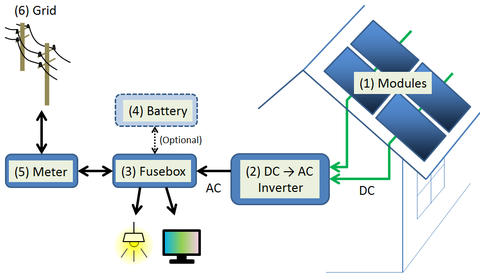

DC Energy Meter for Solar System – Applications and Advantages
By bluejay | Company News
The DC energy meter for solar system is specifically designed to measure the direct current (DC) output of solar photovoltaic (PV) systems to enable accurate monitoring and management of solar power generation. DC energy meter for solar system by tracking the energy production of a solar system, DC energy meters provide critical data that can help optimize system performance, reduce costs, and improve energy efficiency. This article will introduce its application and advantages.

Application of DC energy meter for solar system
The application range of DC energy meter for solar system covers many key areas, providing key support for the efficient operation and management of solar energy systems.
Real-time monitoring: DC energy meters are used to monitor the energy production of solar photovoltaic (PV) systems in real-time. By measuring the DC current output by the solar panel, the DC energy meter can track the power generation of the solar system in real-time and help users understand the operating status of the system.
Fault detection and troubleshooting: DC energy meters can help detect faults or anomalies in solar systems, such as panel damage, shadow coverage, etc. Prompt detection and elimination of these problems can help maximize the power generation efficiency of the solar system.
Data recording and analysis: DC energy meters can also record energy production data from solar systems and perform analysis and reporting. By analyzing data, users can understand the power generation mode, energy utilization efficiency and other information of the solar system, providing a reference for system optimization and improvement.
Energy management and optimization: Based on the energy data provided by the DC energy meter, users can formulate energy management strategies and optimize the energy utilization of the solar system. For example, scheduling energy consumption according to peak periods of energy generation can maximize the proportion of self-consumption of solar power and reduce reliance on traditional power grids.
Cost settlement and subsidy application: DC energy meters can accurately measure the excess electricity delivered by the solar system to the grid, or the electricity purchased from the grid, providing users with accurate cost settlement basis. In addition, DC energy meters can also be used to apply for solar power generation subsidies or tax incentives.
System monitoring and remote management: Some DC energy meters are equipped with remote monitoring and management functions, allowing users to remotely monitor the energy generation, operating status, and other information of the solar system through the Internet, and facilitate real-time adjustment and management of the system.

Advantages of DC energy meter for solar system
DC energy meter for solar system offer a range of advantages that make them ideal for solar system monitoring and management. Here are four key benefits that detail the advantages of DC energy meters:

High Accuracy: DC energy meter for solar system are highly accurate and can accurately measure the DC power generated by solar systems. Since the efficiency of a solar system is directly related to the amount of energy produced, accurate energy data is critical to the effective management of the system. DC energy meters provide accurate energy data, allowing users to understand system performance in real time and make adjustments accordingly.
Real-time monitoring and timely feedback: DC energy meter for solar system allow real-time monitoring of the energy production of the solar system, including key data such as energy yield, current intensity, etc. This real-time monitoring function enables users to promptly discover any abnormalities or faults in the system and take appropriate measures to resolve them to ensure continuous operation of the system and maximize power generation efficiency.
Fault detection and system optimization: DC energy meter for solar system can detect faults or anomalies in solar systems, such as panel failures, shadow occlusion, etc. Prompt detection and resolution of these problems can help maximize the system’s power generation efficiency. By analyzing the data provided by the DC energy meter, users can also identify potential problems with the system and take steps to optimize them, thereby improving the overall performance of the system.
Data logging and analysis: DC energy meter for solar system have data logging and analysis capabilities, capable of recording solar system energy generation data and performing detailed data analysis and reporting. By analyzing these data, users can understand the power generation mode, energy utilization efficiency, and system operating status of the solar system. This data recording and analysis function provides strong support for system optimization and improvement, allowing users to formulate appropriate management strategies based on actual conditions and maximize system performance and reliability.
In summary, the advantages of DC energy meters in solar systems include high accuracy, real-time monitoring and feedback, fault detection and system optimization, and data recording and analysis capabilities. These advantages make DC energy meters an indispensable tool for solar system monitoring and management, providing users with comprehensive and accurate energy data, and helping to achieve efficient operation and management of solar systems.
Related Articles
Tags
Company News
The DC energy meter for solar system is specifically designed to measure the direct current (DC) output of solar photovoltaic (PV) systems to enable accurate monitoring and management of solar power generation. DC energy meter for solar system by tracking the energy production of a solar system, DC energy meters provide critical data that can help optimize system performance, reduce costs, and improve energy efficiency. This article will introduce its application and advantages.

Application of DC energy meter for solar system
The application range of DC energy meter for solar system covers many key areas, providing key support for the efficient operation and management of solar energy systems.
Real-time monitoring: DC energy meters are used to monitor the energy production of solar photovoltaic (PV) systems in real-time. By measuring the DC current output by the solar panel, the DC energy meter can track the power generation of the solar system in real-time and help users understand the operating status of the system.
Fault detection and troubleshooting: DC energy meters can help detect faults or anomalies in solar systems, such as panel damage, shadow coverage, etc. Prompt detection and elimination of these problems can help maximize the power generation efficiency of the solar system.
Data recording and analysis: DC energy meters can also record energy production data from solar systems and perform analysis and reporting. By analyzing data, users can understand the power generation mode, energy utilization efficiency and other information of the solar system, providing a reference for system optimization and improvement.
Energy management and optimization: Based on the energy data provided by the DC energy meter, users can formulate energy management strategies and optimize the energy utilization of the solar system. For example, scheduling energy consumption according to peak periods of energy generation can maximize the proportion of self-consumption of solar power and reduce reliance on traditional power grids.
Cost settlement and subsidy application: DC energy meters can accurately measure the excess electricity delivered by the solar system to the grid, or the electricity purchased from the grid, providing users with accurate cost settlement basis. In addition, DC energy meters can also be used to apply for solar power generation subsidies or tax incentives.
System monitoring and remote management: Some DC energy meters are equipped with remote monitoring and management functions, allowing users to remotely monitor the energy generation, operating status, and other information of the solar system through the Internet, and facilitate real-time adjustment and management of the system.

Advantages of DC energy meter for solar system
DC energy meter for solar system offer a range of advantages that make them ideal for solar system monitoring and management. Here are four key benefits that detail the advantages of DC energy meters:

High Accuracy: DC energy meter for solar system are highly accurate and can accurately measure the DC power generated by solar systems. Since the efficiency of a solar system is directly related to the amount of energy produced, accurate energy data is critical to the effective management of the system. DC energy meters provide accurate energy data, allowing users to understand system performance in real time and make adjustments accordingly.
Real-time monitoring and timely feedback: DC energy meter for solar system allow real-time monitoring of the energy production of the solar system, including key data such as energy yield, current intensity, etc. This real-time monitoring function enables users to promptly discover any abnormalities or faults in the system and take appropriate measures to resolve them to ensure continuous operation of the system and maximize power generation efficiency.
Fault detection and system optimization: DC energy meter for solar system can detect faults or anomalies in solar systems, such as panel failures, shadow occlusion, etc. Prompt detection and resolution of these problems can help maximize the system’s power generation efficiency. By analyzing the data provided by the DC energy meter, users can also identify potential problems with the system and take steps to optimize them, thereby improving the overall performance of the system.
Data logging and analysis: DC energy meter for solar system have data logging and analysis capabilities, capable of recording solar system energy generation data and performing detailed data analysis and reporting. By analyzing these data, users can understand the power generation mode, energy utilization efficiency, and system operating status of the solar system. This data recording and analysis function provides strong support for system optimization and improvement, allowing users to formulate appropriate management strategies based on actual conditions and maximize system performance and reliability.
In summary, the advantages of DC energy meters in solar systems include high accuracy, real-time monitoring and feedback, fault detection and system optimization, and data recording and analysis capabilities. These advantages make DC energy meters an indispensable tool for solar system monitoring and management, providing users with comprehensive and accurate energy data, and helping to achieve efficient operation and management of solar systems.
Related Articles






